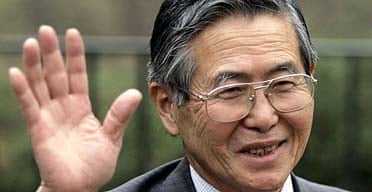Alberto Fujimori was a surprise winner of Peru's 1990 presidential election. After a decade of rule his presidency came to an abrupt and ignominious end when he fled to Japan amid allegations of bribery and corruption.
Peruvians will remember Fujimori's decade-long reign for tackling economic chaos and political extremism, but the clouds of human rights abuse, theft and political scandal cast a long shadow over his presidency.
In 1990, the mathematician and one-time television host beat the presidential frontrunner, Mario Vargas Llosa, by capitalising on disenchantment with the previous president, Alan García.
Fujimori's initial rule was characterised by rapid privatisation, but gradually rumours grew about alleged abuses of power in collusion with his intelligence chief, Vladimiro Montesinos. While many Peruvians thank Fujimori for defeating the violent Shining Path guerrillas, he stands accused of embezzling millions of dollars from the government and allegedly sanctioning the operations of a secret death squad - a battalion of army intelligence officers known as the Colina group, which was tasked with hunting down and killing suspected guerrillas.
In July 1992, masked men kidnapped night nine students and a professor in a night-time raid on their dormitory at the University of La Cantuta, outside the capital, Lima. Their bodies were found months later. All had been murdered.
The Colina crimes are at the centre of human rights charges for which Fujimori was extradited. He is accused of running Colina with Juan Rivero Lazo, another intelligence chief.
Fujimori's reign came to an abrupt end in November 2000, when he fled an Asia-Pacific Economic Coordination summit in Brunei amid allegations of trying to bribe his opponents to gain a third term in office.
Flying to Tokyo, he faxed in his resignation as president, although the Peruvian Congress instead voted to remove him on the grounds of being "morally disabled".
In Japan, Fujimori - the son of Japanese immigrants - claimed citizenship and was thus protected from extradition.
Fujimori arrived in Chile in November 2005, unannounced in a private jet, with a strategy for launching his political comeback. The move, however, was foiled by the Chilean authorities, which immediately arrested him at the airport and jailed him.
During his time in Chile, Fujimori ran an unsuccessful campaign running for the Japanese senate.
While living under house arrest in the Chilean capital, Santiago, the Chilean supreme court ruled that Fujimori should be extradited to face trial in Peru.
Human rights groups claimed it was the first time a court anywhere in the world had ordered the extradition of a former leader to be tried in his home country for human rights violations.
Now facing 30 years in jail, Fujimori remains defiant. While awaiting extradition, he admitted his government made "terrible mistakes" but said: "In the trials themselves, I will show that I acted in a correct manner."
Fujimori split from his wife, Susana Higuchi, in 1998 after 24 years of marriage and a bitter divorce battle in which she accused him of corruption and he sacked her as First Lady. Their daughter, Keiko, is now a member of Congress and a strong supporter of her father.
